PEP小学英语小升初语法单词总复习必备
小升初英语必背短语(知识清单)-人教PEP版英语六年级下册
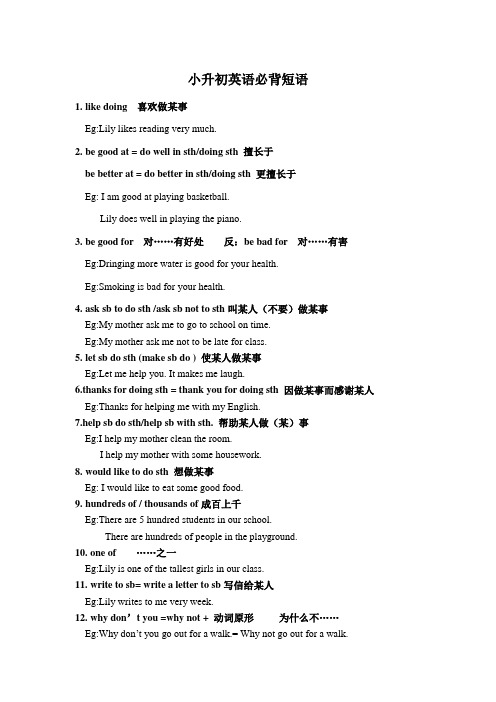
小升初英语必背短语1.like doing 喜欢做某事Eg:Lily likes reading very much.2.be good at = do well in sth/doing sth 擅长于be better at = do better in sth/doing sth 更擅长于Eg: I am good at playing basketball.Lily does well in playing the piano.3.be good for 对……有好处反:be bad for 对……有害Eg:Dringing more water is good for your health.Eg:Smoking is bad for your health.4.ask sb to do sth /ask sb not to sth叫某人(不要)做某事Eg:My mother ask me to go to school on time.Eg:My mother ask me not to be late for class.5.let sb do sth (make sb do ) 使某人做某事Eg:Let me help you. It makes me laugh.6.thanks for doing sth = thank you for doing sth 因做某事而感谢某人Eg:Thanks for helping me with my English.7.help sb do sth/help sb with sth. 帮助某人做(某)事Eg:I help my mother clean the room.I help my mother with some housework.8.would like to do sth 想做某事Eg: I would like to eat some good food.9.hundreds of / thousands of成百上千Eg:There are 5 hundred students in our school.There are hundreds of people in the playground.10.one of ……之一Eg:Lily is one of the tallest girls in our class.11.write to sb= write a letter to sb写信给某人Eg:Lily writes to me very week.12.why don’t you =why not + 动词原形为什么不……Eg:Why don’t you go out for a walk.= Why not go out for a walk.13.something important 一些重要的事情不定代词+形容词14.it’s time to do sth= it’s time for sth.是时候做某事了Eg:It’s time to have lunch.= It’s time for lunch.15.be like问性格,look like 问外貌be like 范围更大一些,有时候既问性格也问外貌Eg:What's your sister like? 你姐姐怎么样?/你姐姐是怎样一个人?She is kind. 她很善良。
pep小升初英语总复习资料大全
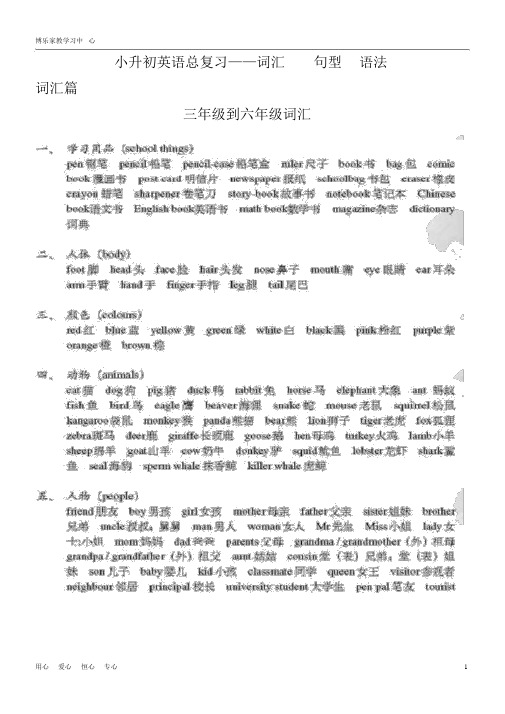
小升初英语总复习——词汇句型语法词汇篇三年级到六年级词汇六年级英语总复习-词语归类一、写出完全形式。
1. w h o' s w h o i s2. sh e' s sh e i s3. he' s he i s4. w h at ' s w h at i s5.w her e’s w her e i s6. w e'r e w e ar e7. yo u' r e yo u ar e8. t hat 's th at i s9.I'm I am10.i sn 't i s not11. ar en't ar e not12. they'r e t hey ar e 13.don't do not14.let's let us15. can’t can not 16. it's it is17. I ’ veI have18. I’d I would19. hasn ’t has not二、写出下列单词的复数形式。
1. b u s b u ses2. b o x b o x es3. gl ass g l asses4. cl ass cl asses5. w at c h w at c h es6. m an go m ang o e s7. f i r ef l y f i r ef l i es8. s h eep sh e ep9. peo p l e p eop l e 1 0. m an m en11. w o m an w o m en 1 2. ap p l e ap p l es 1 3. f am i l y f am i l i es 1 4. l i b r ar y l i br ar i es15. b ab y b ab i es 1 6. b o y bo y s 17.toy toys18.child children19.foot feet20.strawberry strawberries21.horse horse 22.policeman policemen23.dress dresses 24. fish fish25.tooth teeth 26.country countries 27. foot feet28.dragonfly dragonflies29.me us30.building buildings31. cloth clothes32. this these33. that those 34.circle circles 35.story stories三、反义词或对应词。
PEP小升初语法、常用句型总复习

15.--- A:Whose coat is this? ---B:It’s mine.
16.--- A:Who’s your art teacher?(你的美术老师是谁?)---B: Mr Jones.
---B:Sure.Here you are.(当然可以,给你。)
22.---A:What can you do for the party, children?(孩子们,你们能为联欢会做什么?)
----B:I cansing English songs. (我会唱英文歌。)
23.---A: Can you do any kung fu, John? (约翰,你会武术吗?)
---A: I’m angry. What should I do?
---B:You should take a deep breath.
36.---A: How tall are you?你有多高?
--- B:I’m 1.65 metres.我1.65米高。
37. ---A: How heavy are you?你有多重?
3.动词的现在进行时(ing):climbing (正在)攀登eating(正在)吃playing(正在)玩耍jumping(正在)跳drinking(正在)喝(水)sleeping (正在)睡觉doing morning exercises (正在)做早操have…class (正在)上。。。课eating lunch (正在)吃午饭reading a book (正在)看书listening to music (正在)听音乐
pep小升初英语总复习资料大全 (词汇 句型 语法)
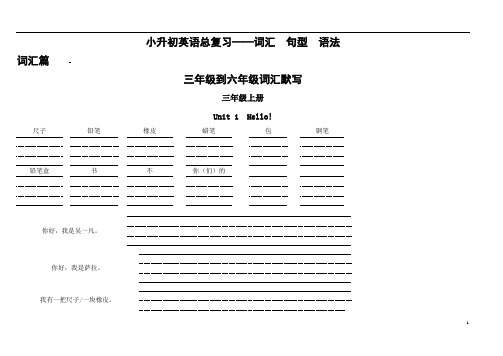
小升初英语总复习——词汇句型语法词汇篇三年级到六年级词汇默写三年级上册Unit 1 Hello!尺子铅笔橡皮蜡笔包钢笔铅笔盒书不你(们)的你好,我是吴一凡。
你好,我是萨拉。
我有一把尺子/一块橡皮。
你叫什么名字?我叫约翰。
再见!再见,怀特小姐。
Unit 2 Colours红色的绿色的黄色的蓝色的黑色的棕色的白色的橙色的好;行妈妈琼斯先生,这是格林小姐。
早上好,格林小姐。
我看见红色。
下午好,吴一凡见到你很高兴。
见到你也很高兴。
把它涂成棕色吧!Unit 3 Look at me!脸耳朵眼睛鼻子嘴胳膊手头身体腿脚学校你好吗?我很好,谢谢你!我们一起上学吧!看我!很好,谢谢!(让)我们一起做个木偶吧!太棒了!Unit 4 We love animals鸭子猪猫熊狗大象猴子鸟老虎大熊猫动物园滑稽的,好笑的这是什么?(它)是一只鸭子。
那是什么?酷!我喜欢它。
Unit 5 Let's eat1面包果汁蛋牛奶水蛋糕鱼米饭请给我些果汁。
给你。
吃点面包吧。
我饿了!请给我些水好吗?不用谢。
Unit 6 Happy birthday!一二三四五六七八九十兄;弟盘子请给我这个。
好的。
(你要)几个盘子?生日快乐!你几岁(了)?我六岁(了)。
三年级下册Unit 1 Welcome back to school英国加拿大美国中国她学生学生;(尤指)他教师男孩和,与女孩小学生新的朋友今天欢迎!你是哪里人?我是英国人。
Unit 2 My family父亲,爸爸男人女人母亲,妈妈姐,妹兄,弟(外)祖母(口语)(外)祖母(外)祖父(口语)(外)祖父家庭那位男士是谁呀?他是我爸爸。
那位女士是谁呀?她是我妈妈。
她是你妈妈吗?是的,她是。
他是你爸爸吗?不,他不是。
Unit 3 At the zoo瘦的胖的,肥的高的矮的,短的长的小的大的长颈鹿这么,那么儿童(单数)儿童(复数)尾巴它好高啊!到这里来,孩子们!它有个长鼻子。
它有小眼睛和大耳朵。
六年级下册英语课件小升初总复习语法要点 全国通用(共26张PPT)
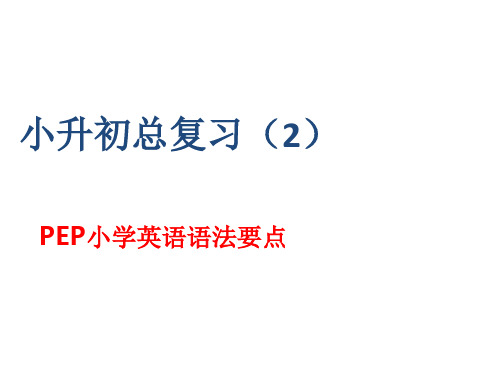
⑶带有was或were的句子,其否定、疑问的变 化和is, am, are一样,即否定句在was或were 后加not,一般疑问句把was或were调到句首。 3.句中没有be动词的一般过去时的句子
否定句:didn’t +动词原形,如:Jim didn’t go home yesterday.
一般疑问句:在句首加did,句子中的动词过 去式变回原形。如:Did Jim go home yesterday?
一般现在时的构成
1. be动词:主语+be(am,is,are)+其它。 如: I am a boy.我是一个男孩。He is a student .他是一个学生 2.行为动词:主语+行为动词(+其它)。 如: We study English.我们学习英语。 当主语为第三人称单数(he, she,it)时, 要在动词后加"-s"或"-es"。如:Mary likes Chinese.玛丽喜欢汉语。
小升初总复习(2)
PEP小学英语语法要点
一、 一般现在时:
1.表示事物或人物的特征、状态。
如:The sky is blue.天空是蓝色的。 He is a boy 他是个男孩 she has long hair .她有长头发
2.表示经常性或习惯性的动作。如:I get up at six every day.我每天六 点起床。一般的时间词有:often , sometimes ,everyday ,usually
3、there be 句型的否定句在be 动词后加not , 一般疑问句把be 动词调到句首。
4、there be句型与have(has) 的区别: there be 表示在某地有某物(或人); have(has) 表示某人拥有某物。 5、some 和any 在there be 句型中的运用: some 用于肯定句, any 用于否定句或疑问句。
PEP英语小升初知识点归纳

PEP英语小升初知识点归纳(一)短语和词组line up 排列 a long tail 一条长尾巴than you taller 比你高how heavy 多重how long多长how big 多大have a fever 发烧have the flu 患流感a big nose 一个大鼻子have a headache 头痛go to the park 去公园watch TV看电视at night 在夜晚play the piano 弹钢琴play football 踢足球listen to music听音乐go swimming 去游泳wash clothes 洗衣服feel tired 感觉劳累take some medicine 吃药worry about 焦急,担心have a sore throat 喉咙疼have a toothache 牙痛laugh at 因…而发笑eat good food 品尝美食buy present 买礼物take pictures 照相learn Chinese 学汉语folk dance 民族舞folk clothes 民族服装this weekend 这个周末by plane (by air)乘飞机 a taxi driver 出租车司机go skiing去滑雪far from 离….远farewell party欢送会last day of the holiday 假期的最后一天good luck 好运at the museum/airport 在博物馆/飞机场in the future 在将来the end of the school 学年末carrot juice 胡萝卜汁 a book of stamps 一本邮册just a minute 等一会Stone forest 石林Spring city 春城on the moon 在月球funny tongue twisters 有趣的绕口令a few days 几天the deep cold water 在寒冷的深水a pair of 一双theme park 主题公园read a magazine 阅读杂志comic book 漫画书fruit stand 水果摊shoe store鞋店pet shop 宠物商店go to the cinema 去看电影go away 离开go back to school 返回学校go hiking 远足go on a big trip 进行一次长途旅行answer the door 开门answer the phone 接电话answer----answering(现在分词)take off 脱下take a trip 去旅行take---took (过去式) taking(现在分词) takes(单三)do the dishes洗碗碟do morning exercises 晨练do an experiment 做实验did(过去式)do housework 做家务do homework 做作业do—does (单三) doing (现在分词)write a report 写报告write a letter 写信write an e-mail 写电子邮件write a poem 写诗write (writes 单三)(writing现在分词)(wrote 过去式)make a snowman 堆雪人make a kite(make kites) 制作风筝make the bed 整理床铺collect insects 收集昆虫collect stamps 收集邮票collect leaves 收集树叶make sure 确认cook the meals 做饭cook noodles 煮面条catch the ball 接球catch butterflies 捉蝴蝶catch—caught(过去式) catches(单三)交通用语stop at a red light 红灯停wait a yellow light 黄灯等go at a green light 绿灯行by bike 骑自行车on foot 步行by car(take the car)/by subway/ by ship crosswalk人行穿越道No entry禁止通行No bikes自行车禁行One way单行道Turn right 右转No turn left 禁止左转告别语write soon尽快给我回信take care保重have a trip 旅途愉快keep up touch 保持联系see you later 一会见(二)词的用法A.名词复数例:book---books watch—watches baby---babies knife---knives roof--roofs foot---feet man—men goose—geese ox--oxen child—children mouse---mice tomato—tomatoes fish—fish deer—deer Chinese –Chinese Japanese—Japanese woman doctor-----women doctorsB.冠词例:a worker a pen an hour an apple an orange the pictureC.代词例:I(主格)---me(宾格)my(形容词物主代词)-----mine(名词性物主代词) You ----you your ---- yoursHe -----him his ------ hisShe ----her her ------hersWe ---us our ------oursYou ---you your ------yoursThey -- them their -------theirs(注:This is my jacket.(同义句) This jacket is mine.D.数词.基数词one two three four …..序数词first second third fourth fifth eighth ninth twentieth thirty—first(第三十一)F.形容词比较级和最高级例:tall—taller big---bigger heavy—heavier late—later beautiful—more beautiful good/well---better---best(最高级) many/much---more---most(最高级)ill/bad----worse-----worst(最高级) little-------less---------least(最高级)old---older/elder—oldest/eldest(最高级) far—farther/further—farthest/furthest(最高级) 例句:I am taller than your brother. He is shorter than me.(三)英语时态的简单用法A..一般现在时(当主语是单数第三人称时,谓语动词要发生相应的变化,即单三形式)(always usually often sometimes never every day …..这些词出现体现一般现在时)例1.)He always helps others. 他总是帮助别人。
(人教PEP)六年级英语下册课件 小升初语法总复习 1

用法:过去时间发生的或过去经常性的动作 常用时间状语:yesterday,last night,two days ago, in 2000,at that time,before liberation,when 等引导的 含 过去时的句子。 动词构成:动词过去时(-ed) worked work 否定构成:didn’t+动原 didn’t work 一般疑问构成及简答举例:Did+主语+动原+其它? Yes,主语+did./No, 主语+didn’t.
study—studies
D.以“f或fe”结尾变f或fe为v,再加-es knife-knives
E.不规则名词复数man-men woman-women policeman-policemen policewoman-policewomen mouse-mice foot-feet child-children fish-fish Chinese-Chinese
一般疑问构成及简答: Do+主语+动原+其它?Yes,I do. Does+主语+动原+其它?No,he doesn’t. 特殊疑问举例 : 1. What do you often do on Sundays? 2. Where does he live?
1. She ______________ (go) to school at eight o’clock. 2. It’s six o’clock. They are _____________ supper. (eat) 3. He usually ___________ up at 17:00.(get ) 4. She ___________ (live) in Beijing. 5. Sally _________ (be) here just now. (刚才) 6. _______ (be) there a fly (苍蝇) on the table just now? 7. They are __________ (dig) a hole (洞). 8. My father _______________ (mend) his model(模型) plane these days
人教版PEP六年级英语下册小升初重点单词及短语复习资料

Unit1g e t up起床have breakfast吃早餐go t o school去上学School begins.开始上课have lunch吃午饭School is over放学go home回家have dinner吃晚饭watch TV看电视go t o bed睡觉breakfast早餐lunch午餐dinner晚餐cook breakfast做早餐teach English教英语take a walk散步read stories读故事walk走;步行every每一个morning早晨六年级上册单词表afternoon下午evening晚上;傍晚see a film看电影play the piano弹钢琴clean the window擦窗户clean the door擦门clean the floor擦地板often时常easy容易difficult困难Unit2collect toy cars搜集玩具汽车collect stamps搜集邮票collect maps搜集地图collect picture cards搜集图片open开;打开hobby爱好map地图box盒子colour颜色go fishing去钓鱼plant flowers种花cook meals做饭dad爸爸mum妈妈plant植物;种植flower花drink喝tea茶play computer games玩电脑游戏mak e dolls tak e pho t os照相photo照片kid小孩baby婴儿hungry饿的cry哭Unit3invite your friends t o your party 邀请朋友参加聚会celebrate your birthday with your friends与朋友庆祝生日time时间after在......后then那时me我(I的宾格)bye再见star-shaped cake星形蛋糕jelly果冻fruit pie水果派;水果馅饼kind种类chocolate巧克力ice cream冰激凌candy糖果sure当然light the candles点蜡烛sing the birthday so ng唱生日歌mak e a wish许愿blow out the candles吹蜡烛cut the cake切蛋糕eat the cake吃蛋糕here在这里for给;为了light点燃Unit4the first month of the year 一年里的第一个月the second month of the year 一年里的第二个月New Y ear's Day元旦Spring Festival春节January一月February二月back回原处;后面their他(她,它)们的the third month of the year 一年里的第三个月the fourth month of the year 一年里的第四个月T ree Planting Day植树节Easter复活节March三月April四月tree树;树木grass草;草地st op(使)停egg蛋;卵the fifth month of the year一年里的第五个月the sixth month of the year一年里的第六个月Labour Day劳动节May五月June六月M other’s Day母亲节Children’s Day儿童节Father’s Day父亲节hear d-shaped cake心形蛋糕give a birthday card t o your friend向朋友赠送生日礼Unit5the seventh month of the year一年里的第七个月the eighth month of the year一年里的第八个月the Party’s birthday党的生日Army Day建军节July七月August八月month月Dayyear 年the ninth month of the year 一年里的第九个月the tenth month of the year 一年里的第十个月 National Day 国庆节 September 九月 October 十月the eleventh month of the year 一年里的第十一个月the twelfth month of the year一年里的第十二个月Thanksgiving 感恩节 Christmas 圣诞节 November 十一月December 十二月Teacher’s 教师节Unit 6farm the land 种地;种田go on spring outgoings 去春游 fly kites 放风筝season 季节spring 春天little 一点green 绿色(的) bird 鸟 fly 飞go on a trip 去旅游go t o a summer camp 去夏令营 have summer holidays 过暑假 begin 开始 close 关;关闭 summer 夏天 weather 天气 heavy 重的 rain 雨;下雨 pick apples 摘苹果 cut rice 割稻子mak e a snowman 堆雪人 sweep the snow aut umn 秋天yellow 黄色(的)brown 棕色(的) white 白色(的) winter 冬天snowman 雪人六年级上册短语总结Unit11.be from/come from来自于20.have dinner吃晚餐2.Primary Six第六小学21.watch TV看电视3.Grade Six六年级22.for30minutes30分钟4.let sb do sth让某人做某事5.tell sb abo ut sth告诉某人关于某事6.tell sb t o do sth告诉某人做某事7.daily life日常生活8.ge t up起床9.in the morning在早上10.have breakfast吃早饭11.at six在六点钟at abo ut six在六点钟12.go t o school去学校13.School begins开始上课14.have seven subjects有七门课15.have lunch吃午餐16.at school在学校17.School is over放学18.in the afternoon在下午19.go home回家23.do some reading阅读24.go t o bed去睡觉25.How abo ut=w hat abo ut怎么样26.best wishes最好的祝愿27.be happy t o do sth高兴做某事28.get your email收到你的邮件29.in Grade Six在六年级30.an English teacher一位英语老师31.every morning每天早上32.cook breakfast做早饭33.go t o school去上学34.have four lessons a day一天有四节课35.learn English学英语36.by doing sth通过做某事37.play games玩游戏38.like sth very much非常喜欢某事39.cook dinner做晚餐40.after dinner晚饭 2.have a look看一看41.take a walk散步 3.open the box and see打开盒子看一看42.read sth t o sb读某东西给某人 4.What a super car!多棒的一辆小车啊!43.On Saturday每周六 5.collect stamps收集邮票44.see a film看电影 6.1)How abo u t you?你呢?45.have piano lessons上钢琴课46.It is adj t o do sth做某事是怎么样的47.help sb(to)do sth帮助某人做某事48.help sb with sth帮助某人某事49.practice doing sth练习做某事50.enjoy doing sth喜欢做某事51.at home在家52.do the housework做家务53.learn from sb向某人学习54.should do sth应该做某事55.teach English教英语56.read stories读故事57.clean the window擦窗户58.clean the door擦门59.clean the floor擦地板Unit21.a new toy car一辆新的小汽车2)How abo ut doing sth?做...怎么样?7.collect maps收集地图8.collect picture cards收集图片9.so colourful and beautiful如此多彩漂亮10.want t o do sth想要做某事11.look at看一看12.my family pho t o s我的全家福13.plant flowers种花14.drink Chinese tea喝中国茶15.That’s great那太棒了!16.That’s interesting那太有趣了!17.That’s wonderful那太棒了!18.look at this photo看这个照片19.in this photo在这个照片里20.at her birthday party在她的生日派对21.make a doll=mak e dolls做布娃娃22.be interested in sth对某事感兴趣d23.be interested in doing sth对做某事感兴趣much. 非常感谢5.would like t o do sth. = want t o do sth.24.play computer games 玩电脑游戏想要做某事25.take pho t o s 拍照片 6.my birthday party 我的生日聚会 26.two phot o s 两张照片 7.I ’ l ove to. 我愿意。
六年级小升初英语知识点pep
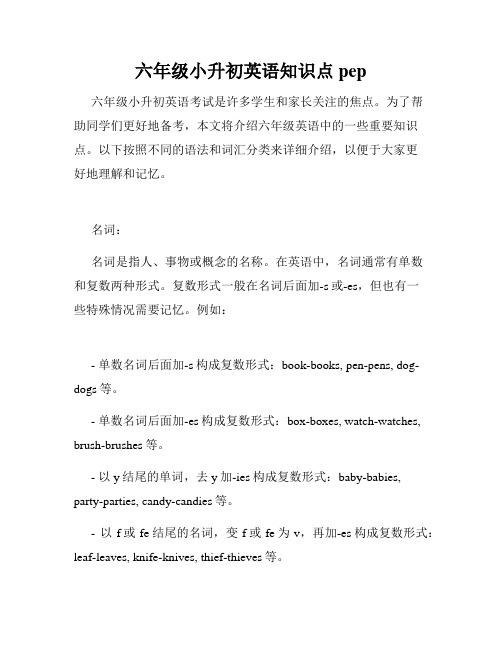
六年级小升初英语知识点pep 六年级小升初英语考试是许多学生和家长关注的焦点。
为了帮助同学们更好地备考,本文将介绍六年级英语中的一些重要知识点。
以下按照不同的语法和词汇分类来详细介绍,以便于大家更好地理解和记忆。
名词:名词是指人、事物或概念的名称。
在英语中,名词通常有单数和复数两种形式。
复数形式一般在名词后面加-s或-es,但也有一些特殊情况需要记忆。
例如:- 单数名词后面加-s构成复数形式:book-books, pen-pens, dog-dogs等。
- 单数名词后面加-es构成复数形式:box-boxes, watch-watches, brush-brushes等。
- 以y结尾的单词,去y加-ies构成复数形式:baby-babies,party-parties, candy-candies等。
- 以f或fe结尾的名词,变f或fe为v,再加-es构成复数形式:leaf-leaves, knife-knives, thief-thieves等。
动词:动词是指表示行为或状态的词语。
根据时态和语态的不同,动词的形式和用法也会有所不同。
- 一般现在时:用于描述经常发生的动作、现在的状态或真理。
例如:I go to school every day.(我每天去学校。
)- 现在进行时:用于表示现在正在进行的动作。
现在进行时的动词由be动词(am, is, are)和动词的现在分词构成。
例如:He is playing basketball now.(他正在打篮球。
)- 一般过去时:用于过去某个时间发生的动作。
一般过去时的动词通常是在动词原形后面加-ed构成。
例如:We visited the museum yesterday.(昨天我们参观了博物馆。
)- 一般将来时:用于表示将来要发生的动作或事件。
一般将来时的动词前面要加助动词will。
例如:I will study harder next year.(明年我将更加努力学习。
PEP小学英语小升初语法-单词总复习必备
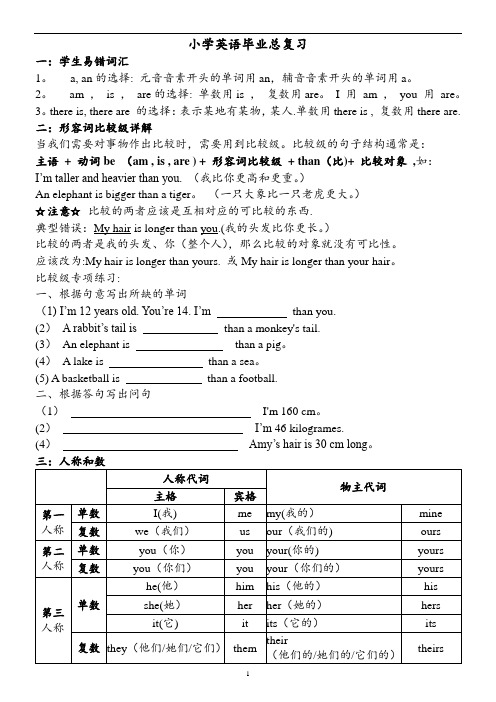
小学英语毕业总复习一:学生易错词汇1。
a, an的选择: 元音音素开头的单词用an,辅音音素开头的单词用a。
2。
am ,is ,are的选择: 单数用is ,复数用are。
I 用am ,you 用are。
3。
there is, there are 的选择:表示某地有某物,某人.单数用there is , 复数用there are. 二:形容词比较级详解当我们需要对事物作出比较时,需要用到比较级。
比较级的句子结构通常是:主语+ 动词be (am , is , are ) + 形容词比较级+ than(比)+ 比较对象,如:I’m taller and heavier than you. (我比你更高和更重。
)An elephant is bigger than a tiger。
(一只大象比一只老虎更大。
)☆注意☆比较的两者应该是互相对应的可比较的东西.典型错误:My hair is longer than you.(我的头发比你更长。
)比较的两者是我的头发、你(整个人),那么比较的对象就没有可比性。
应该改为:My hair is longer than yours. 或My hair is longer than your hair。
比较级专项练习:一、根据句意写出所缺的单词(1) I’m 12 years old. You’re 14. I’m than you.(2)A rabbit’s tail is than a monkey's tail.(3)An elephant is than a pig。
(4)A lake is than a sea。
(5) A basketball is than a football.二、根据答句写出问句(1)I'm 160 cm。
(2)I’m 46 kilogrames.(4)Amy’s hair is 30 cm long。
用所给词的适当形式填空1。
PEP人教版小学(小升初)英语单词归类汇总大全(精心整理可直接打印)
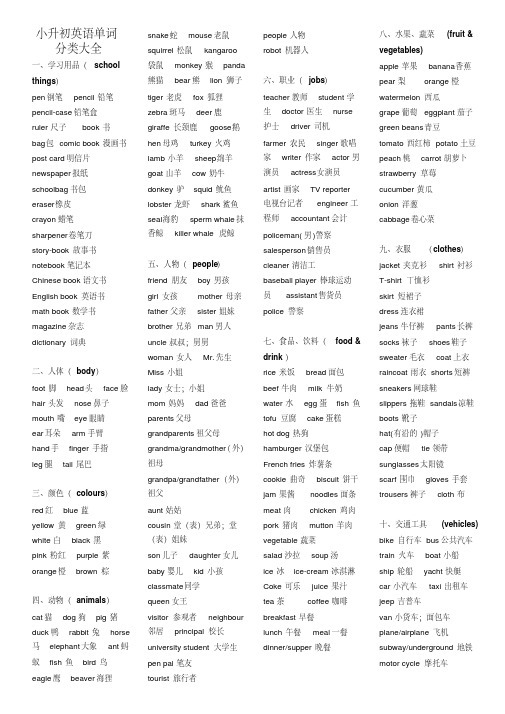
小升初英语单词分类大全一、学习用品(school things)pen钢笔pencil铅笔pencil-case铅笔盒ruler尺子book书bag包comic book漫画书post card明信片newspaper报纸schoolbag书包eraser橡皮crayon蜡笔sharpener卷笔刀story-book故事书notebook笔记本Chinese book语文书English book英语书math book数学书magazine杂志dictionary词典二、人体(body)foot脚head头face脸hair头发nose鼻子mouth嘴eye眼睛ear耳朵arm手臂hand手finger手指leg腿tail尾巴三、颜色(colours)red红blue蓝yellow黄green绿white白black黑pink粉红purple紫orange橙brown棕四、动物(animals)cat猫dog狗pig猪duck鸭rabbit兔horse 马elephant大象ant蚂蚁fish鱼bird鸟eagle鹰beaver海狸snake蛇mouse老鼠squirrel松鼠kangaroo袋鼠monkey猴panda熊猫bear熊lion狮子tiger老虎fox狐狸zebra斑马deer鹿giraffe长颈鹿goose鹅hen母鸡turkey火鸡lamb小羊sheep绵羊goat山羊cow奶牛donkey驴squid鱿鱼lobster龙虾shark鲨鱼seal海豹sperm whale抹香鲸killer whale虎鲸五、人物(people)friend朋友boy男孩girl女孩mother母亲father父亲sister姐妹brother兄弟man男人uncle叔叔;舅舅woman女人Mr.先生Miss小姐lady女士;小姐mom妈妈dad爸爸parents父母grandparents祖父母grandma/grandmother(外)祖母grandpa/grandfather(外)祖父aunt姑姑cousin堂(表)兄弟;堂(表)姐妹son儿子daughter女儿baby婴儿kid小孩classmate同学queen女王visitor参观者neighbour邻居principal校长university student大学生pen pal笔友tourist旅行者people人物robot机器人六、职业(jobs)teacher教师student学生doctor医生nurse护士driver司机farmer农民singer歌唱家writer作家actor男演员actress女演员artist画家TV reporter电视台记者engineer工程师accountant会计policeman(男)警察salesperson销售员cleaner清洁工baseball player棒球运动员assistant售货员police警察七、食品、饮料(food &drink)rice米饭bread面包beef牛肉milk牛奶water水egg蛋fish鱼tofu豆腐cake蛋糕hot dog热狗hamburger汉堡包French fries炸薯条cookie曲奇biscuit饼干jam果酱noodles面条meat肉chicken鸡肉pork猪肉mutton羊肉vegetable蔬菜salad沙拉soup汤ice冰ice-cream冰淇淋Coke可乐juice果汁tea茶coffee咖啡breakfast早餐lunch午餐meal一餐dinner/supper晚餐八、水果、蔬菜(fruit &vegetables)apple苹果banana香蕉pear梨orange橙watermelon西瓜grape葡萄eggplant茄子green beans青豆tomato西红柿potato土豆peach桃carrot胡萝卜strawberry草莓cucumber黄瓜onion洋葱cabbage卷心菜九、衣服(clothes)jacket夹克衫shirt衬衫T-shirt丅恤衫skirt短裙子dress连衣裙jeans牛仔裤pants长裤socks袜子shoes鞋子sweater毛衣coat上衣raincoat雨衣shorts短裤sneakers网球鞋slippers拖鞋sandals凉鞋boots靴子hat(有沿的)帽子cap便帽tie领带sunglasses太阳镜scarf围巾gloves手套trousers裤子cloth布十、交通工具(vehicles)bike自行车bus公共汽车train火车boat小船ship轮船yacht快艇car小汽车taxi出租车jeep吉普车van小货车;面包车plane/airplane飞机subway/underground地铁motor cycle摩托车十一、杂物(other things)window窗户door门desk课桌chair椅子bed床computer计算机board写字板fan风扇light灯teacher’s desk讲台picture图画;照片wall墙壁floor地板curtain窗帘trash bin垃圾箱closet壁橱mirror镜子end table床头柜football/soccer足球present礼物walkman随身听lamp台灯phone电话sofa沙发shelf书架fridge冰箱table桌子TV电视air-conditioner空调key钥匙lock锁photo照片chart图表plate盘子knife刀fork 叉spoon勺子chopsticks筷子pot锅gift礼物toy玩具doll洋娃娃ball球balloon气球kite风筝jigsaw puzzle拼图游戏box盒子umbrella伞zipper拉链violin小提琴yo-yo溜溜球nest鸟窝hole洞tube管子toothbrush牙刷menu菜单e-card电子卡片e-mail电子邮件traffic light交通灯money钱medicine药十二、地点(locations)home家room房间bedroom卧室bathroom卫生间living room起居室kitchen厨房classroom教室school学校park公园library图书馆post office邮局police office警察局hospital医院cinema电影院bookstore书店 farm农场zoo动物园garden花园study书房playground操场canteen食堂teacher’s office教师办公室library图书馆gym体育馆washroom卫生间art room绘画教室computer room计算机教室music room音乐教室TV room电视机房flat公寓company公司factory工厂fruit stand水果摊pet shop宠物商店nature park自然公园theme park主题公园science museum科学博物馆the Great Wall长城supermarket超市bank银行country国家village乡村city城市hometown家乡bus stop公交车站十三、课程(classes)sports体育运动science科学Moral Education思想品德课Social Studies社会课Chinese语文math数学PE体育课English英语课十四、动词(v.)进行体育运动play sports玩;踢play 打架fight游泳swim 滑冰skate爬山climb mountains放风筝fly kites跳舞dance 唱歌sing弹钢琴play the piano晨练;做广播操domorning exercises去远足go hiking堆雪人make a snowman植树plant trees pictures浇花water the flowers照相take pictures听音乐listen to music绘画paint 画画draw去旅行take a trip阅读杂志read a magazine集邮collect stamps下棋play chess驾驶drive飞fly 跳jump 走walk看look 跑run 爬climb荡swing 划row 踢kick骑ride 停stop 等wait爱love 尝taste 闻smell剪shear 放put 折fold寄send 买buy 卖sell逛商店go shopping吃eat 喝drink有;吃have 像;喜欢like帮助help 转弯turn居住live带take教teach 去go 挤奶milk猜guess 反弹bounce回家go home做家务do housework睡觉sleep上床睡觉go to bed铺床make the bed起床get up 醒来wake up穿上put on 脱掉take off挂起hang up 穿wear洗wash洗衣服wash the clothes喝水drink water洗碗do the dishes打扫clean扫地sweep the floor打扫卧室clean thebedroom打扫房间clean the room倒垃圾empty the trash收拾衣服put away theclothes摆饭桌set the table做饭cook the meals做晚饭cook dinner吃早饭eat breakfast吃晚饭eat dinner上学go to school上英语课have Englishclass 学习learn做作业do homework写信write a letter读书books看书read a book写电子邮件write ane-mail观察昆虫watch insects读read 写write看电视watch TV去看电影go to the cinema思考think使用计算机use thecomputer玩电脑游戏playcomputers 工作work接电话answer the phone 看望(外)祖父母visit my grandparents研究study 见面meet欢迎welcome 谢谢thank 喂养feed 传递pass展示show 使用use打开open 关上close 告诉tell 寻找find照耀shine 变成become 感觉到feel 遇见meet落下fall 离开leave下车get offplay(.ed)玩;踢swim(swam)游泳skate滑冰fight(fought)打架swing(swung)荡eat(ate)吃sleep(slept)睡觉like像,喜欢have(had)有;吃turn转弯buy(bought)买take(took)买,带live居住teach(taught)教go(went)去study(studied)学习learn学习sing(sang)唱歌dance跳舞row划do(did)做do homework做作业do housework做家务watch TV看电视read(read) books读书cook the meals做饭water the flowers浇花sweep(swept) the floor扫地clean the bedroom打扫卧室make(made) the bed铺床set(set) the table摆饭桌wash the clothes洗衣服do the dishes洗碗碟use a computer使用计算机do morning exercises晨练;做广播操eat breakfast吃早饭eat dinner吃晚饭go to school上学have English class上英语课play sports进行体育运动get(got)up起床climb mountains爬山go shopping买东西play the piano弹钢琴visit grandparents看望(外)祖父母go hiking去远足fly kites放风筝make a snowman堆雪人plant trees种树draw(drew) pictures画画cook dinner做饭read a book看书answer the phone接电话listen to music听音乐cleanthe room打扫房间write(wrote) a letter写信write an e-mail写电子邮件drink(drank) water喝水take pictures照相watch insects观察昆虫pick up leaves采摘树叶do an experiment做实验catch butterflies捉蝴蝶count insects数昆虫collect insects收集昆虫collect leaves收集树叶write a report写报告play chess下棋have a picnic举行野餐get to到达ride(rode) a bike骑自行车play the violin拉小提琴make kites制作风筝collectstamps集邮meet(met)见面welcome欢迎thank谢谢love爱work工作drink(drank)喝taste尝smell闻feed(fed)喂养shear剪milk挤奶look看guess猜help帮助pass传递show展示use使用clean打扫open打开close关上put放paint绘画tell(told)告诉kick踢bounce反弹ride(rode)骑stop(stopped)停wait等find(found)寻找到drive(drove)驾驶fold折send(sent)寄wash洗shine照耀become变成feel(felt)感觉到think(thought)思考meet(met)遇见fall(fell)落下leave(left)离开wake(woke) up醒来put on穿上take off脱掉hang up挂起wear(wore)穿go home回家go to bed上床睡觉play computer games玩电脑游戏play chess下棋empty the trash倒垃圾put away the clothes收拾衣服get off下车take a trip去旅行read a magazine阅读杂志go to the cinema去看电影go straight向前直走十五、气象(weather)cold寒冷的warm温暖的cool凉爽的snowy下雪的sunny晴朗的hot炎热的rainy下雨的windy有风的cloudy多云的weather report天气预报十六、景物(nature)river河流lake湖泊stream河,溪forest森林path小道road公路house房子bridge桥building建筑物rain雨cloud云sun太阳mountain山sky天空rainbow彩虹wind风air空气moon月亮十七、植物(plants)flower花grass草tree树seed种子sprout苗plant植物rose玫瑰leaf叶子十八、星期(week)Monday星期一Tuesday星期二Wednesday星期三Thursday星期四Friday星期五Saturday星期六Sunday星期天weekend周末十九、月份(months)Jan. (January)一月Feb.(February)二月Mar.(March)三月April四月May五月June六月July七月Aug.(August)八月Sept.(September)九月Oct.(October)十月Nov.(November)十一月Dec.(December)十二月二十、季节(seasons)spring春summer夏fall/autumn秋winter冬二十一、方位(directions)south南north北east东west西left左边right右边二十二、患病(illness)have a fever发烧hurt疼痛have a cold感冒have a toothache牙疼have a headache头疼have a sore throat喉咙疼二十三、数词(numbers)one一two二three三four四five五six六seven七eight八nine九ten十eleven十一twelve十二thirteen十三fourteen十四fifteen十五sixteen十六seventeen十七eighteen十八nineteen十九twenty二十thirty三十forty四十fifty五十sixty六十seventy七十eighty八十ninety九十forty-two四十二hundred百one/a hundred andthirty-six一百三十六first第一second第二third第三fourth第四fifth第五eighth第八ninth第九twelfth第十二twentieth第二十thirtieth第三十fortieth第四十fiftieth第五十sixtieth第六十seventieth第七十eightieth第八十ninetieth第九十fifty-sixth第五十六二十四、形容词(adj.)big大的small小的long长的tall高的short短的;矮的young年轻的old旧的;老的strong健壮的thin瘦的active积极活跃的quiet安静的nice好看的kind和蔼亲切的strict严格的smart聪明的funny滑稽可笑的tasty好吃的sweet甜的salty咸的sour酸的fresh新鲜的favourite最喜爱的clean干净的tired疲劳的excited兴奋的angry生气的happy高兴的bored无聊的sad忧愁的taller更高的shorter更矮的stronger更强壮的older年龄更大的younger更年轻的bigger更大的heavier更重的longer更长的thinner更瘦的smaller更小的good好的fine好的great很好的heavy 重的new新的fat胖的happy快乐的right对的hungry饥饿的cute逗人喜爱的little小的lovely可爱的beautiful漂亮的colourful色彩鲜艳的pretty漂亮的cheap便宜的expensive昂贵的juicy多汁的tender嫩的healthy健康的ill有病的helpful有帮助的high高的easy简单的proud骄傲的sick有病的better更好的higher更高的二十五、介词(prep.)in在…里on在…上;在…时候under在…下面near在…的旁边behind在…后边next to与…相邻over在…上面in front of在…前面二十六、代词(pron.)I我we我们you你;你们he他she她it它they他(她,它)们my我的our 我们的your你的;你们的his他的her她的二十七.疑问词what(什么)when(什么时候)why(为什么)what color(什么颜色)what time(几点)what day(星期几)how old(年龄多大,几岁)how(怎样)how many(多少)how much (多少钱)how tall (多高)how heavy(多重)how long(多长)how big(多大)how large(面积多大)where(在哪里)which(哪一个)who(谁)whose (谁的)二十八、国家、城市(countries & cities)China/PRC中国America/USA美国UK联合王国England英国Canada/CAN加拿大Australia澳大利亚New York纽约London伦敦Sydney悉尼Moscow莫斯科Cairo开罗。
PEP人教版小学(小升初)英语单词归类汇总大全(精心整理,可直接打印)(最新整理)

公寓 company 公司
阅读杂志 read a magazine 上学 go to school
factory 工厂
集邮 collect stamps
上英语课 have English
fruit stand 水果摊
下棋 play chess
学习 learn
pet shop 宠物商店
十一、杂物 (other things)
window 窗户 door 门 desk 课桌 chair 椅子 bed 床 computer 计算机 board 写字板 fan 风扇 light 灯 teacher’s desk 讲台 picture 图画;照片 wall 墙壁 floor 地板 curtain 窗帘 trash bin 垃圾箱 closet 壁橱 mirror 镜子 end table 床头柜 football/soccer 足球 present 礼物 walkman 随身听 lamp 台灯 phone 电话 sofa 沙发 shelf 书架 fridge 冰箱 table 桌子 TV 电视 air-conditioner 空调 key 钥匙 lock 锁 photo 照片 chart 图表 plate 盘子 knife 刀 fork 叉 spoon 勺子 chopsticks 筷子 pot 锅 gift 礼物 toy 玩具 doll 洋娃娃 ball 球 balloon 气球 kite 风筝 jigsaw puzzle 拼图游戏 box 盒子 umbrella 伞 zipper 拉链 violin 小提琴 yo-yo 溜溜球 nest 鸟窝 hole 洞 tube 管子 toothbrush 牙刷 menu 菜单 e-card 电子卡片 e-mail 电子邮件 traffic light 交通灯 money 钱 medicine 药
小学PEP英语总复习3-6年级英语语法总结(最全)
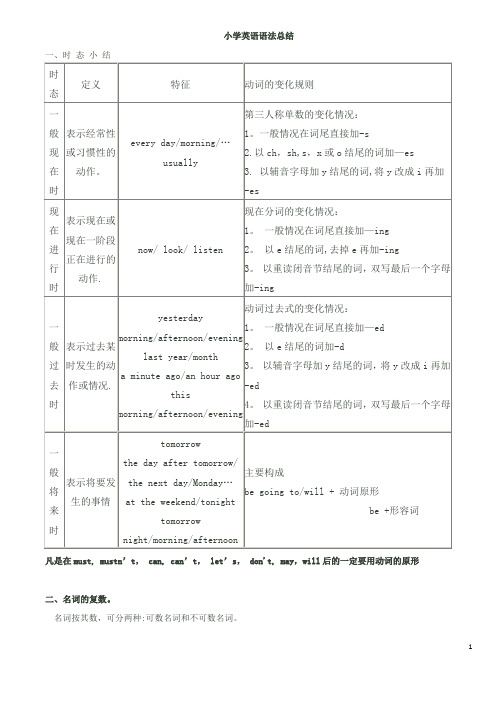
小学英语语法总结一、时态小结凡是在must, mustn’t,can, can’t,let’s, don't, may,will后的一定要用动词的原形二、名词的复数。
名词按其数,可分两种:可数名词和不可数名词。
可数名词的复数变化规则:1。
一般情况下,直接在词尾加-s,如:girl—girls, book-books, pen-pens2。
以s,x,sh,ch结尾的词,在词后加-es, 如:class—classes, box—boxes, match—matches,3. 以辅音字母+y结尾的,变y 为i 再加-es,如:city—cities, family—families, country— countries 4。
以f或fe结尾的,变f或fe为v再加-es,如:knife—knives, wife—wives, life—lives,5。
以o 结尾的加—es或—s, 如: radio-radios, tomato—tomatoes, potato—potatoes, zoo—zoos,photo-photos,6。
man—men, woman-women, foot—feet, child-children,三、形容词的比较级、最高级。
形容词有比较级与最高级之分,单音节词的变化规则:1。
一般情况下,直接在词尾加-er或—est, 如:small-smaller—smallest, short—shorter—shortest2. 以e结尾的,加-er或-est,如:large—larger—largest, nice—nicer—nicest。
3.以辅音字母+y结尾的,变y 为i 再加—er或-est, 如:busy—busier—busiest, heavy—heavier-heaviest。
4。
以重读闭音节,一个辅音字母结尾的,双写该字母,再加—er或—est,如:big—bigger—biggest,thin-thinner-thinnest。
pep小升初英语总复习资料大全
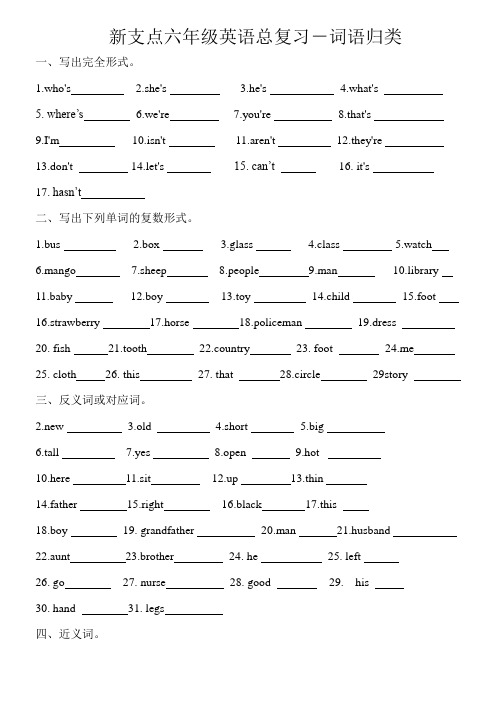
新支点六年级英语总复习-词语归类一、写出完全形式。
1.who's2.she's3.he's4.what's5. where’s6.we're7.you're8.that's9.I'm 10.isn't 11.aren't 12.they're13.don't 14.let's 15. can’t 16. it's17. hasn’t二、写出下列单词的复数形式。
1.bus2.box3.glass4.class5.watch6.mango7.sheep8.people9.man 10.library 11.baby 12.boy 13.toy 14.child 15.foot 16.strawberry 17.horse 18.policeman 19.dress20. fish 21.tooth 22.country 23. foot 24.me25. cloth 26. this 27. that 28.circle 29story三、反义词或对应词。
2.new3.old4.short5.big6.tall7.yes8.open9.hot10.here 11.sit 12.up 13.thin14.father 15.right 16.black 17.this18.boy 19. grandfather 20.man 21.husband22.aunt 23.brother 24. he 25. left26. go 27. nurse 28. good 29. his30. hand 31. legs四、近义词。
1.desk2.like3. often4.start5. great6.good5.五、同音词。
1.to2. right3. no4.for5.hear6. I7. see8. son9.be 10. there 11. U 12. Y 13. by14.pair 15. R 16. whose 17. aunt六、现在分词。
pep小升初词汇表

小升初词汇表(pep)Pep3-6年级词汇ruler n.直尺pencil n. 铅笔eraser n. 橡皮crayon n. 蜡笔bag [ n.包pen n. 钢笔pencil box铅笔盒book 书no 不your 你(们)的red 红色green 绿色的yellow 黄色的黄色blue 蓝色蓝色的black 黑色brown棕色white 白orange 橙色,橙色的face 脸ear 耳朵eye 眼睛nose.鼻子mouth嘴ar m 胳膊hand 手head 头body身体leg 腿foot 脚school 学校duck 鸭子pig 猪cat 猫bear 熊dog 狗elephant 大象monkey猴子bird 鸟tiger 老虎panda 熊猫zoo 动物园funny 滑稽的bread[ 面包juice 果汁、液egg n. 蛋milk n.牛奶water 水cake 蛋糕fish 鱼rice 米饭one 一two 二three 三four 四five 五seven七eight 八nine 九ten[ 十brother 兄;弟plate [盘子UK 英国USA 美国China 中国she 她student ] 学生he 他teacher 教师boy 男孩and 和;与girl 女孩new 新的friend 朋友today 今天father 父亲;爸dad 爸爸;爹爹man 男人woman 女人mother母亲;妈sister 姐;妹brother 兄;弟grandmother祖grandfather祖父family 家;家庭thin 瘦的fat 胖的;肥的short 矮,短的long 长的small 小的big 大的so 这么;那么Children儿童on 在…之上in 在…里under 在…下面chair 椅子desk 书桌cap 帽子ball 球car小汽车boat 小船map 地图toy 玩具box 盒;箱pear 梨apple 苹果orange 橙子banana 香蕉grape 葡萄buy 买fruit 水果eleven 十一twelve 十二thirteen 十三fourteen 十四fifteen 十五sixteen 十六seventeen 十七eighteen 十八nineteen 十九twenty 二十kite 风筝classroom教室window 窗户blackboard 黑板light 电灯picture 图画door 门teacher’s desk讲台fan 风扇wall 墙floor 地板near在…的旁边TV 电视clean 打扫;help 帮助schoolbag 书包math 数学Story 故事candy 糖果notebook笔记toy 玩具key 钥匙cute 可爱的strong 强壮的friendly 朋友( quiet 安静的hair 头发shoe 鞋glasses 眼镜his 他的or 或者right 正确的hat 帽子her 她的bedroom 卧室living room起居室study 书房kitchen 厨房bathroom 卫生间bed [bed] 床phone 电话table 桌子sofa 沙发fridge 冰箱find 找到them 他们beef [bi:f] 牛肉chicken 鸡肉noodle(s)面条soup 汤vegetable 蔬菜chopsticks 筷子bowl 碗fork 叉子knife 小刀spoon 勺子dinner 晚餐;正餐Pass 给;递try 尝试;试parents 父母cousin 表兄妹uncle 叔叔;舅舅aunt 姑姑;婶;姨baby 婴儿doctor 医生cook 厨师driver 司机farmer 农民nurse 护士but 但是little 小的puppy 小狗job 吧、工作basketball 篮球first floor 一楼second floor 二楼teacher’s office 教师办公室library 图书馆playground 操场art room美术教室next to 在…近旁homework 作业class 班;班级forty 四十way 方向breakfast 早饭lunch 午餐;午饭music class 音乐课PE class 体育课dinner 午餐get up 起床go to school上学go home 回家go to bed 睡觉over 结束now 现在;目前o’clock ……点钟kid 小孩thirty 三十hurry 快点e on 快;加油cold 寒冷的;冷的cool 凉的;凉爽的warm 温暖的hot 热的;烫的sunny 阳光充足的windy 多风的cloudy 多云的snowy 下雪的rainy 多雨的outside 在户外weather 天气fly 飞love爱tomato 西红柿potato 土豆carrot 胡萝卜horse 马cow 母牛;奶牛sheep 羊;绵羊hen 母鸡these 那些animal 兽;动物those 那些garden 花园;菜园farm 农场goat 山羊eat 吃clothes 衣服;服装pants 裤子hat 带檐的)帽子dress 连衣裙skirt 女裙coat 外衣;大衣sweater 毛衣sock 短袜shorts 短裤jacket 夹克衫shirt (男士)衬衫yours你的,你们的whose 谁的mine 我的glove手套umbrella 伞;雨伞sunglasses 太阳镜pretty 精致的expensive 昂贵的cheap 便宜的nice 好的try on 试穿size 尺码;号too 太;过于just 正好;恰好how much 多少钱eighty 八十dollar美元more 更多的us 我们(宾格)old年老的young 年轻的funny 可笑的.kind和蔼的strict严格的.polite有礼貌的hard-working勤奋helpful有帮助的clever 聪明的shy害羞的know知道. 了解our 我们的sometimes 有时候robot机器人him (he的宾格)他speak 会说,会讲finish完成;做完Monday)星期一Tuesday星期二Wednesday星期三Thursday星期四[Friday星期五Saturday星期六Sunday星期天.weekend 周末wash 洗watch 看read 看,读play 玩play football 踢足球cooking 做饭often 常常;时常park 公园sport 体育运动every 每一个day一天;一日sandwich 三明治salad 蔬菜沙拉hamburger 汉堡包ice cream 冰淇淋tea 茶水;茶fresh 新鲜的healthy健康的delicious 美味的hot 辣的;辛辣的sweet 甜的drink 喝;饮thirsty 口渴的favorite最喜爱的food 食物onion 洋葱;葱头sing 唱;歌唱song 歌曲do kung fu 练武术dance 跳舞draw画cartoon 漫画cook烹调swim 游泳play basketball 打篮球speak English说英语party 聚会;派对next 下一个wonderful了不起learn 学习;学会any [任何的problem 问题want 想要send 发送;邮寄clock 钟,时钟plant 植物bottle 瓶子water bottle 水瓶bike 自行车photo 照片;相片in front of在...前面between在…之间;above 在……上面beside 在…旁边behind在…的后面there 那儿their 他们的house 房屋;房子lots of大量,许多flower花;花朵move 搬家dirty 肮脏的everywhere 到处,mouse 老鼠live 居住nature 自然界forest 森林river 河流lake 湖泊mountain 山脉hill 小山tree 树;树木bridge 桥building建筑物village 乡村;村庄house 房子;住宅boating 划船go boating 去划船rabbit 兔子,野兔high 高的science 科学museum 博物馆post office邮局bookstore 书店cinema 电影院hospital 医院crossing十字路口turn 转弯left 左straight 笔直地right 右ask 问interesting有趣的Italian意大利的restaurant餐馆pizza 比萨饼street大街;街道get 到达feature 特点follow 跟着far 较远的tell 告诉on foot 步行bus 公共汽车plane 飞机taxi 出租汽车ship (大)船subway 地铁train 火车slow 慢的down减少;降低slow down慢下来stop 停下Mrs 夫人early早到的helmet 头盔/ must 必须wear 戴attention 注意pay attention to 注意traffic 交通traffic lights信号灯Germany 德国fast 快的ferry轮渡visit 拜访film 电影see a film 看电影trip 旅行take a trip去旅行supermarket超市evening晚上;傍晚tonight 在今晚tomorrow 明天next week下周dictionary 词典ic滑稽的ic book连环画word单词postcard 明信片lesson 课space 太空travel 旅行half 一半price 价格together 一起get together聚会mooncake月饼poem 诗moon 月亮puzzle 谜hiking 远足/ pen pal 笔友hobby业余爱好idea 想法;主意amazing令人惊奇goal 射门club 俱乐部share分享factory 工厂worker 工人postman 邮递员businessman商人police officer警察fisherman渔民scientist 科学家pilot 飞行员coach 教练country 国家head teacher校长sea 大海stay 保持university 大学gym 体育馆if 如果reporter 记者use 使用type 打字quickly 快速地secretary 秘书angry 生气的afraid 害怕/ sad 难过的worried 担心的;happy 高兴的see a doctor看病wear 穿more 更多的deep 深的breath 呼吸take a deep breath 深深吸一口气count 数数count to ten数到十chase 追赶mice (mouse复数)老鼠bad 邪恶的;坏的hurt (使)受伤ill 有病;不舒服wrong 有毛病should 应该feel 觉得;感到well 健康;身体好sit 坐grass 草坪hear 听见ant 蚂蚁worry担心;担忧mud 泥pull 拉;拽everyone 每人taller 更高的shorter 更矮的stronger 更强壮的older 年龄更大的一、看字写拼音(你能写正确吗?)嗡( )朗润( )酝酿( ) 卖弄( )喉咙( )应和( )嘹亮( ) 烘托( )静默( )风筝( )抖擞( ) 健壮( )呼朋引伴( ) 花枝招展( ) 镶()单单( )安适( )着落( ) 慈善( )肌肤( ) 秀气( )宽敞( )空灵( )贮蓄( ) 澄清( ) 地毯( )蝉( )花苞( )娇媚( )彩棱镜( )粗犷( ) 睫毛( )衣裳( )铃铛( ) 端庄( )静谧( ) 屋檐( ) 凄冷( )化妆( ) 莅临( )造访( ) 吝啬( )淅沥( )干涩( )草垛( ) 绿茵茵( ) 咄咄逼人( )二、看拼音写汉字(他们可是很难的哦!挑战一下吧)tān huàn bào nùchén jìshìnòng chuídǎ( ) ( ) ( ) ( ) ( )qiáo cuìyāng qiúxù dāo juébiédàn yǎ() () () () ()gāo jiélàn màn fān lái fùqùxǐ chū wàng wài() () () ()xìn fúfēn qíqǔ juéyī shàliǎng quán() () ) ) )lín lín gèdéqísuǒdìgěn nì xiào mù dǎo gào zǐmèi() ) ) ) ) ) tíng páihuázhē bìxīn liúzhuǎn yīn bì() ) ) ) ))三、古诗文默写:(你还会背吗?)(1) 水何澹澹,。
完整版)pep小升初英语总复习资料大全
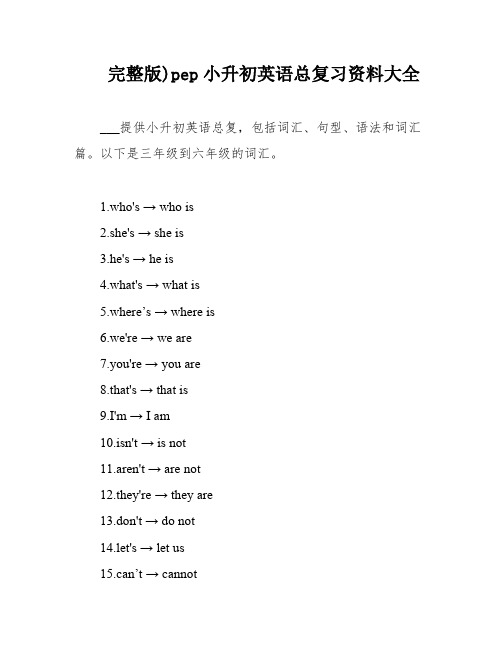
完整版)pep小升初英语总复习资料大全___提供小升初英语总复,包括词汇、句型、语法和词汇篇。
以下是三年级到六年级的词汇。
1.who's → who is2.she's → she is3.he's → he is4.what's → what is5.where’s → where is6.we're → we are7.you're → you are8.that's → that is9.I'm → I am10.isn't → is not11.aren't → are not12.they're → they are13.don't → do not14.let's → let us15.can’t → cannot16.it's → it is17.I’ve → I have18.I’d → I would19.hasn’t → has not以下是单词的复数形式。
1.bus → buses2.box → boxes3.glass → glasses4.class → classes5.watch → watches6.mango → mangoes7.firefly → fireflies8.sheep → ___9.people → people10.man → men11.woman → women12.apple → apples13.family → families14.library → libraries15.baby → babies16.boy → ___17.toy → ___18.child → children19.foot → feet20.strawberry → ___21.horse → horses22.policeman → ___23.dress → dresses24.fish → fish25.___ → ___26.country → countries27.foot → feet28.dragonfly → dragonflies29.menu → ___30.building → buildings31.___ → ___32.this → these33.that → those34.circle → circles35.story → stories最后是反义词或对应词。
小升初英语语法复习要点归纳(PEP版)
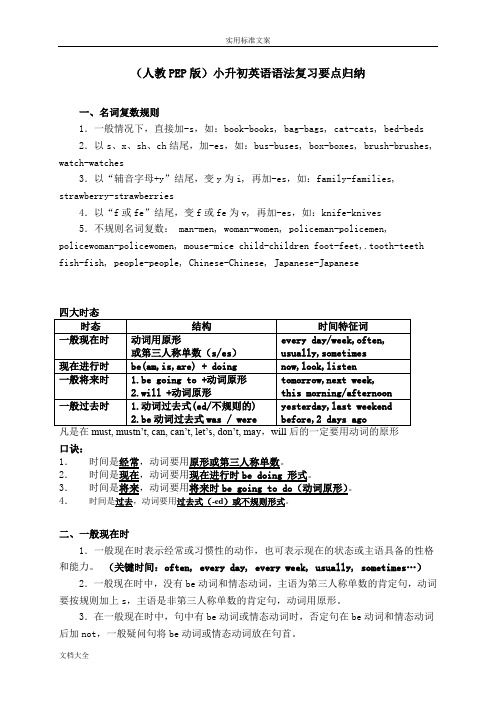
(人教PEP版)小升初英语语法复习要点归纳一、名词复数规则1.一般情况下,直接加-s,如:book-books, bag-bags, cat-cats, bed-beds 2.以s、x、sh、ch结尾,加-es,如:bus-buses, box-boxes, brush-brushes, watch-watches3.以“辅音字母+y”结尾,变y为i, 再加-es,如:family-families, strawberry-strawberries4.以“f或fe”结尾,变f或fe为v, 再加-es,如:knife-knives5.不规则名词复数: man-men, woman-women, policeman-policemen, policewoman-policewomen, mouse-mice child-children foot-feet,.tooth-teeth fish-fish, people-people, Chinese-Chinese, Japanese-Japanese口诀:1.时间是经常,动词要用原形或第三人称单数。
2.时间是现在,动词要用现在进行时be doing 形式。
3.时间是将来,动词要用将来时be going to do(动词原形)。
4.时间是过去,动词要用过去式(-ed)或不规则形式。
二、一般现在时1.一般现在时表示经常或习惯性的动作,也可表示现在的状态或主语具备的性格和能力。
(关键时间:often, every day, every week, usually, sometimes…)2.一般现在时中,没有be动词和情态动词,主语为第三人称单数的肯定句,动词要按规则加上s,主语是非第三人称单数的肯定句,动词用原形。
3.在一般现在时中,句中有be动词或情态动词时,否定句在be动词和情态动词后加not,一般疑问句将be动词或情态动词放在句首。
4.在一般现在时中,句中没有be动词或情态动词时,主语为第三人称单数的否定句在动词前加does+not (doesn’t),一般疑问句在句首加does,句子中原有动词用原形;主语为非第三人称单数,否定句用do+not (don’t),一般疑问句在句首加do,句子中动词用原形。
PEP小升初总复习_四至六年英语知识点点归纳
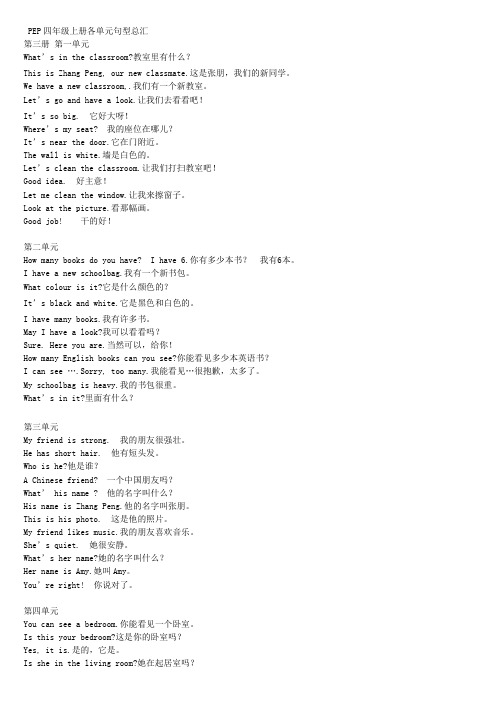
PEP四年级上册各单元句型总汇第三册第一单元What’s in the classroom?教室里有什么?This is Zhang Peng, our new classmate.这是张朋,我们的新同学。
We have a new classroom,.我们有一个新教室。
Let’s go and have a look.让我们去看看吧!It’s so big.它好大呀!Where’s my seat?我的座位在哪儿?It’s near the door.它在门附近。
The wall is white.墙是白色的。
Let’s clean the classroom.让我们打扫教室吧!Good idea. 好主意!Let me clean the window.让我来擦窗子。
Look at the picture.看那幅画。
Good job! 干的好!第二单元How many books do you have? I have 6.你有多少本书?我有6本。
I have a new schoolbag.我有一个新书包。
What colour is it?它是什么颜色的?It’s black and white.它是黑色和白色的。
I have many books.我有许多书。
May I have a look?我可以看看吗?Sure. Here you are.当然可以,给你!How many English books can you see?你能看见多少本英语书?I can see ….Sorry, too many.我能看见…很抱歉,太多了。
My schoolbag is heavy.我的书包很重。
What’s in it?里面有什么?第三单元My friend is strong. 我的朋友很强壮。
He has short hair. 他有短头发。
Who is he?他是谁?A Chinese friend? 一个中国朋友吗?What’ his name ?他的名字叫什么?His name is Zhang Peng.他的名字叫张朋。
PEP小升初英语考试重点知识点
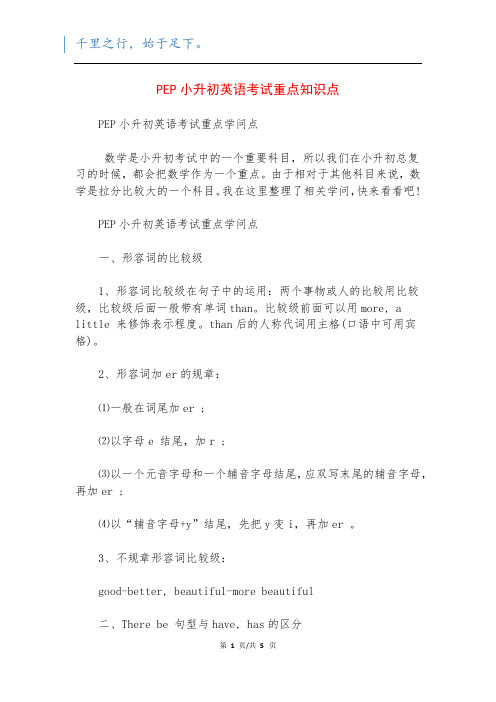
PEP小升初英语考试重点知识点PEP小升初英语考试重点学问点数学是小升初考试中的一个重要科目,所以我们在小升初总复习的时候,都会把数学作为一个重点。
由于相对于其他科目来说,数学是拉分比较大的一个科目。
我在这里整理了相关学问,快来看看吧!PEP小升初英语考试重点学问点一、形容词的比较级1、形容词比较级在句子中的运用:两个事物或人的比较用比较级,比较级后面一般带有单词than。
比较级前面可以用more, alittle 来修饰表示程度。
than后的人称代词用主格(口语中可用宾格)。
2、形容词加er的规章:⑴一般在词尾加er ;⑵以字母e 结尾,加r ;⑶以一个元音字母和一个辅音字母结尾,应双写末尾的辅音字母,再加er ;⑷以“辅音字母+y”结尾,先把y变i,再加er 。
3、不规章形容词比较级:good-better, beautiful-more beautiful二、There be 句型与have, has的区分1、There be 句型表示:在某地有某物(或人)2、在there be 句型中,主语是单数,be 动词用is ; 主语是复数,be 动词用are ; 如有几件物品,be 动词依据最靠近be 动词的那个名词打算。
3、there be 句型的否定句在be 动词后加not , 一般疑问句把be 动词调到句首。
4、there be句型与have(has) 的区分:there be 表示在某地有某物(或人);have(has) 表示某人拥有某物。
5、some 和any 在there be 句型中的运用:some 用于确定句,any 用于否定句或疑问句。
6、and 和or 在there be句型中的运用:and 用于确定句, or 用于否定句或疑问句。
7、针对数量提问的特别疑问句的基本结构是:How many + 名词复数 + are there + 介词短语?How much + 不行数名词 + is there + 介词短语?8、针对主语提问的特别疑问句的基本结构是:Whats + 介词短语?三、一般过去时1、一般过去时表示过去某个时间发生的动作或存在的状态,常和表示过去的时间状语连用。
- 1、下载文档前请自行甄别文档内容的完整性,平台不提供额外的编辑、内容补充、找答案等附加服务。
- 2、"仅部分预览"的文档,不可在线预览部分如存在完整性等问题,可反馈申请退款(可完整预览的文档不适用该条件!)。
- 3、如文档侵犯您的权益,请联系客服反馈,我们会尽快为您处理(人工客服工作时间:9:00-18:30)。
小学英语毕业总复习一:学生易错词汇1. a, an的选择: 元音音素开头的单词用an,辅音音素开头的单词用a.2. am , is , are的选择: 单数用is , 复数用are. I 用am , you 用are.3.there is, there are 的选择:表示某地有某物,某人。
单数用there is , 复数用there are. 二:形容词比较级详解当我们需要对事物作出比较时,需要用到比较级。
比较级的句子结构通常是:主语+ 动词be (am , is , are ) + 形容词比较级+ than(比)+ 比较对象,如:I’m taller and heavier than you. (我比你更高和更重。
)An elephant is bigger than a tiger. (一只大象比一只老虎更大。
)☆注意☆比较的两者应该是互相对应的可比较的东西。
典型错误:My hair is longer than you.(我的头发比你更长。
)比较的两者是我的头发、你(整个人),那么比较的对象就没有可比性。
应该改为:My hair is longer than yours. 或My hair is longer than your hair.比较级专项练习:一、根据句意写出所缺的单词(1) I’m 12 years old. You’re 14. I’m than you.(2) A rabbit’s tail is than a monkey’s tail.(3) An elephant is than a pig.(4) A lake is than a sea.(5) A basketball is than a football.二、根据答句写出问句(1) I’m 160 cm.(2) I’m 46 kilogrames.(4) Amy’s hair is 30 cm long.三:人称和数人称代词物主代词主格宾格第一人称单数I(我)me my(我的)mine 复数we(我们)us our(我们的)ours第二人称单数you(你)you your(你的)yours 复数you(你们)you your(你们的)yours第三人称单数he(他)him his(他的)hisshe(她)her her(她的)hersit(它)it its(它的)its 复数they(他们/她们/它们)themtheir(他们的/她们的/它们的)theirs用所给词的适当形式填空1. That is not _________ kite. That kite is very small, but _________ is very big. ( I )2. The dress is _________. Give it to _________. ( she )3. Is this _________ watch? (you) No, it’s not _________ . ( I )4. _________ is my brother. _________ name is Jack. Look! Those stamps are _________. ( he )5. _________ dresses are red. (we) What colour are _________? ( you )6. Here are many pens, which one is _________ ? ( she )7. I can find my toy, but where’s _________? ( you )8. Give _________ your kite, OK? (they)9. I have a beautiful cat. _________name is Mimi. These cakes are _________. ( it )10. Are these _________ balls? No, _________ are not _________. _________ aren’t here. ( they )11. I have a lovely brother. _________ is only 3. I like _________ very much. ( he )12. _________ is my aunt. Do you know _________ job? _________ a nurse. ( she )13. That is not _________ phone. _________is at home. ( he )14. Where are _________? I can’t find _________. Let’s call _________ parents. ( they )15. _________ sister is ill. Please go and see _________. ( she )16. _________ don’t know her name. Would you p lease tell _________. ( we )四:句型专项归类1、肯定句:是指用肯定的语气来陈述的句子,如:I’m a student.She is a doctor.He works in a hospital.There are four fans in our classroom.He will eat lunch at 12:00.I watched TV yesterday evening.2、否定句:含有否定词或表示否定意义词的句子,如:I’m not a student.She is not (isn’t) a doctor.He does not (doesn’t) work in a hospital.There are not (aren’t) four fans in our classroom.He will not (won’t) eat lunch at 12:00.I did not (didn’t) watch TV yesterday eve ning.☆注意☆小结:否定句主要是在肯定句的基础上加上了否定词“not”。
有动词be的句子则“not”加在be后面。
没有动词be的句子则要先在主要动词的前面加上一个助动词(do,does,did),然后在它后面加上“not”,3、一般疑问句:是指询问事实的句子,此类句子必须用“yes”,或“no”来回答。
如:Are you a student? Yes, I am/ No, I’m not.Is she a doctor? Yes, she is. / No, she is n’t.Does he work in a hospital? Yes, he does. / No, he does n’t.Are there four fans in our classroom? Yes, there are. / No, there are n’t.Are you going to buy a comic book tonight? Yes, I am. / No, I am not. (Yes, we are. / No, we are n’t.)Will he eat lunch at 12:00? Yes, I will. / No, I will not(won’t).Did you watch TV yesterday evening? Yes, I did. / No, I did n’t.☆注意☆小结:一般疑问句是在肯定句的基础上,①把动词be调到首位,其他照写,末尾标点符号变成问号即可。
②没有动词be的句子则要在句首加上一个助动词(do,does,did)再把紧跟在后面的动词变回原形,末尾标点符号变成问号即可。
一般现在时:一般现在时的构成1. be动词:主语+be(am, is, are)+其它。
如:I am a boy. 我是一个男孩。
2. 行为动词:主语+行为动词(+其它)。
如:We study English. 我们学习英语。
当主语为第三人称单数(he, she, it)时,要在动词后加"-s"或"-es"。
如:Mary likes Chinese.玛丽喜欢汉语。
小学英语主要句型归类(三年级上册----六年级下册)IV询问时间或日期。
1, ----What time is it now? ----现在几点钟?----It’s nine o’clock.. It’s time for English class.----九点。
该上英语课了。
(----It’s eight o’clock. It’s time to go to bed.)(----八点。
该上床睡觉了。
)2, ----What day is it today? ----今天星期几?----It’s Monday. ----星期一。
3, ----When is your birthday? ----你的生日是什么时候?----It’s October 1st, our National Day. ----十月一日,国庆节。
4, ----When do you do morning exercises? ----你们什么时候做早锻炼?----I usually do morning exercises at 8:30. ----我们通常8:30做早锻炼。
V询问方位或地方。
1, ----Where is my toy car? ----我的玩具汽车在哪儿?----It’s here, under the chair. ----在这儿,在椅子下面。
2, ----Where is the canteen? ----餐厅在哪儿?----It’s on the first floor. ----在一楼。
3, ----Excuse me. Where is the library, please? ----对不起,请问图书馆在哪儿?----It’s near the post office.----在邮局附近。
VI询问想吃的东西。
1, ----What would you like for breakfast / lunch / dinner ? ----你早餐/中餐/晚餐想吃点什么? ----I’d like some bread and milk / rice and soup. ----我想吃面包和牛奶/米饭和汤。
